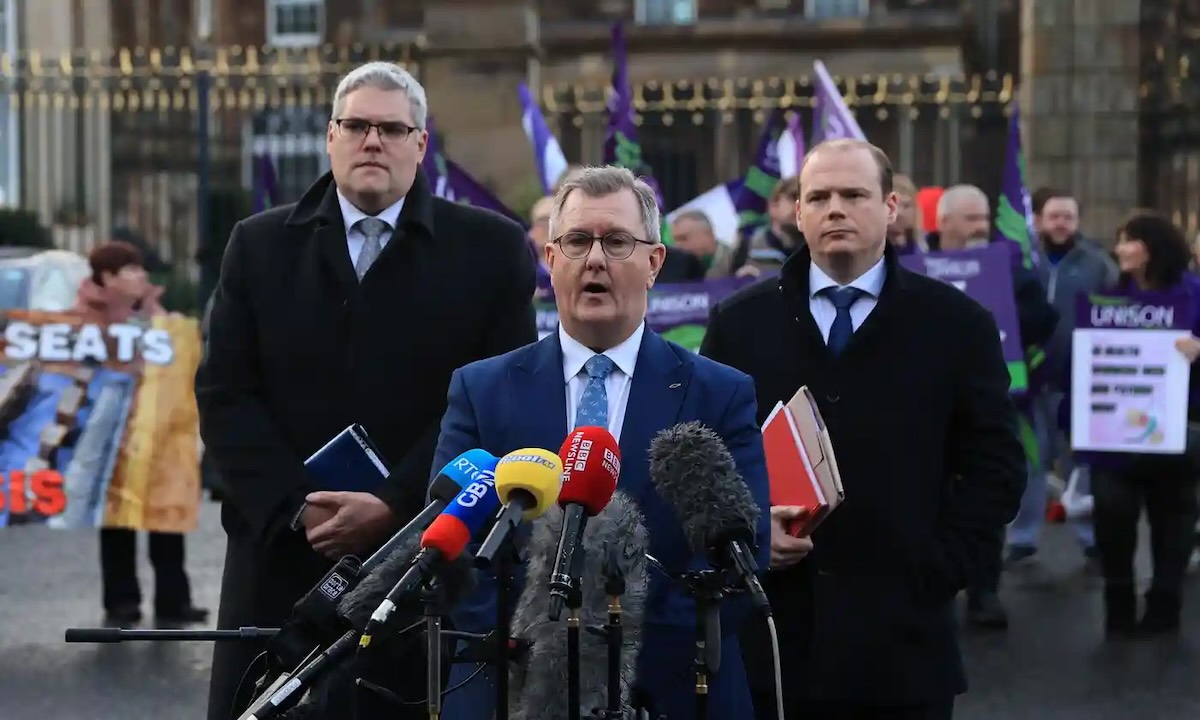
The DUP is under renewed pressure to end its boycott of power-sharing in the North and accept a multi-billion pound British financial package which would deliver substantial funding across the North’s public sector.
After three days of talks and almost 22 months of the DUP boycott, the party faces what Sinn Féin leader Mary Lou McDonald described as “make your mind up time”.
Public impatience with the collapsed institutions set up under the Good Friday Agreement has festered due to never-ending unionist demands related to Brexit. After Sinn Féin were returned as the largest party last year, they have refused to take their place in the Stormont legislature.
In advance of the latest talks, Sinn Féin declared the Brexit negotiations were “complete”, only to be contradicted by both the British government and the DUP.
That raised a question over the limited scope of the Hillsborough talks event, once a major event on the peace process calendar for both politicians and journalists.
Sinn Féin’s Conor Murphy has said that the discussions on the North’s financial stability ‘are not the real negotiations and not to be fooled’.
They are are set to continue next week, but the continuing failure of the DUP to justify their pointless boycott and evident public anger over the dysfunction of the partitionist institutions makes it difficult to see how public credibility can be restored.
Over 2.5 billion pounds to settle public sector pay disputes and a pledge to raise the ‘fiscal floor’, increasing the North’s funding allocation, would come as a reward for the DUP coming to its senses.
Both nationalist parties used the opportunity of the talks to ask for even more cash, and it is understood there was no discussion of the economic solutions afforded by ending partition.
The discussions were supposedly independent of the ‘negotiations’ on Brexit that the British government has been having with the DUP since at least early summer – but that idea was challenged when British Prime Minister Rishi Sunak, speaking in Westminster, offered a further concession to the unionist hardliners on “UK Integration”.
Speaking directly to Donaldson who had made the journey to London, Sunak said his government “does stand ready to legislate to protect Northern Ireland’s integral place in the United Kingdom and the UK internal market, alongside an agreement to restore the executive.”
Another issue not aired by the political parties in interviews in the chilly Hillsborough carpark was the issue of Stormont reform, seen as increasingly essential to the decades-long struggle to ‘make Northern Ireland work’.
Nevertheless, it is widely believed that it’s ‘make your mind up time’ for the DUP to ‘get back to work’, a point hammered home by protestors from the public sector unions.
Ms McDonald said on Wednesday that this is now a “decision-making point for the Treasury in terms of money” and “for the DUP in terms of power-sharing”.
“We have to ensure that the institutions are properly funded so that we can deliver fair pay for public sector workers, so we can finance public services and deliver for people,” she said.
If the discussions were planned to allow DUP leader Jeffrey Donaldson a soft landing, there has been no sign of it yet – but he fuelled speculation that the Stormont boycott might be somehow decoupled from the Brexit dispute.
He said: “Well, look, they are two separate processes, let’s be clear about that.
“But every day that we make progress is a day that takes us closer to securing our objectives. But we are not there yet. There is still work to be done. This process is not concluded.”
He said his party would need to examine the legislation Rishi Sunak was proposing in order to “future-proof” the North’s access to the British internal market “in all scenarios”.
The talks are due to resume on Monday.
![[Irish Republican News]](https://republican-news.org/graphics/title_gifs/rn.gif)
![[Irish Republican News]](https://republican-news.org/graphics/title_gifs/harp.gif)

